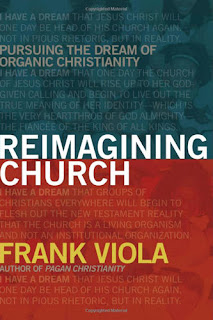Reimagining Church
If you ever want a challenging read regarding the status quo
of the church then Frank Viola is your man!
I was deeply challenged by his book Pagan Christianity and have really
enjoyed Reimagining Church: Pursuing the dream of Christianity. I do not agree with all Frank writes but I do
agree that we need a paradigm shift regarding the church from institutionalism
to a more organic way of being. He
helpfully describes the institutional paradigm and the organic paradigm in the
table below, as you read it I wonder which you would prefer to be a part of?
Institutional Paradigm
|
Organic Paradigm
|
Sustained by clergy system
|
Knows nothing about a clergy system
|
Seeks to energise the laity
|
Doesn’t recognise a different class called laity
|
Limits many functions to the ordained
|
Makes all members functioning priests
|
Renders the bulk of its congregant’s passive in their ‘pews’
|
Allows and encourages all Christians to engage in whatever ministry
god has called them to
|
Associates church with a building, a denomination, or a religious
service
|
Affirms that people do not go to church; affirms that they (together)
are the church
|
Is rooted in unifying those who share a special set of customs or
doctrines
|
Is rooted in unreserved fellowship with all Christians based on Christ
alone
|
Places its priority on programme and rituals that keep its congregants
at arm’s length, insulating them from one another
|
Places its priorities on face to face, shared life relationships,
mutual submission, openness, freedom, mutual service, and spirituality
reality-the very elements that were built into the NT church
|
Depends on forced tithing and huge budgets
|
Depends on the spirit of god to bring about generous, grace based
giving among members
|
Spends most of its resources on building expenditures and
pastor-staff salaries
|
Spends most of its resources on ‘the poor among you’ and travelling
workers who preach the gospel and plant new churches
|
Operates on the basis that the pastor/priest is the functional head
(while Christ is the nominal head)
|
Operates on the basis that Christ is the functional head through the
invisible guidance of the holy spirit through the believing community
|
Extols and protects the clergy, programme-centred system that serves
as the driving machine of the organised church
|
Rejects the clergy system because it quenches the sovereign exercise of
the Holy Spirit yet lovingly embraces every Christian within the system
|
Recognises and affirms hierarchical leadership
|
Rejects hierarchical leadership; recognises and affirms the organic leadership
of the whole body
|
Builds programmes to fuel the church; treats people as cogs in the
machine
|
Builds people together in Christ to provide the momentum of the
church
|
Encourages believers to participate institutionally and hierarchically
|
Initiates believers to participate relationally and spiritually
|
Separates church (ecclesiology) from personal salvation
(soteriology): views the former as a mere appendage to the latter
|
Forges no link between personal salvation and the church; sees the
two as inextricably intertwined.
(Scripture has it that when people were saved, they simultaneously
became part of the church and immediately met together[1]
|
I am sure there are grey areas above and I like you may have
some arguments about some of the statements.
But! I do recognise the desperate
need for a paradigm shift. I know which
community I would prefer to be a part of having been shattered by institutional
church with its too high expectations of leadership and programme orientated ministry. I have been so effected by this that as I go
about looking to be a part of an organic movement I go about thinking about it
in an institutional way! I have become despondent by institutional churches arms length love and unradical community. Its time for a change. A change to the Acts 2 model.
However, the thing I notice most as we go about making this
paradigm shift is the cost. The cost to
me of privilege, finances and status (some already made but much more to come).
And the cost to other believers (especially spectator ones) as they
share much of the load that sits on the shoulders of the one or two. But I am willing to take the cost. The thought of a vibrant Christian community impacting its community is too much of an adventure to begin by counting the cost...
So… for now… I’m excited about organic Christianity, what
about you?

No comments:
Post a Comment